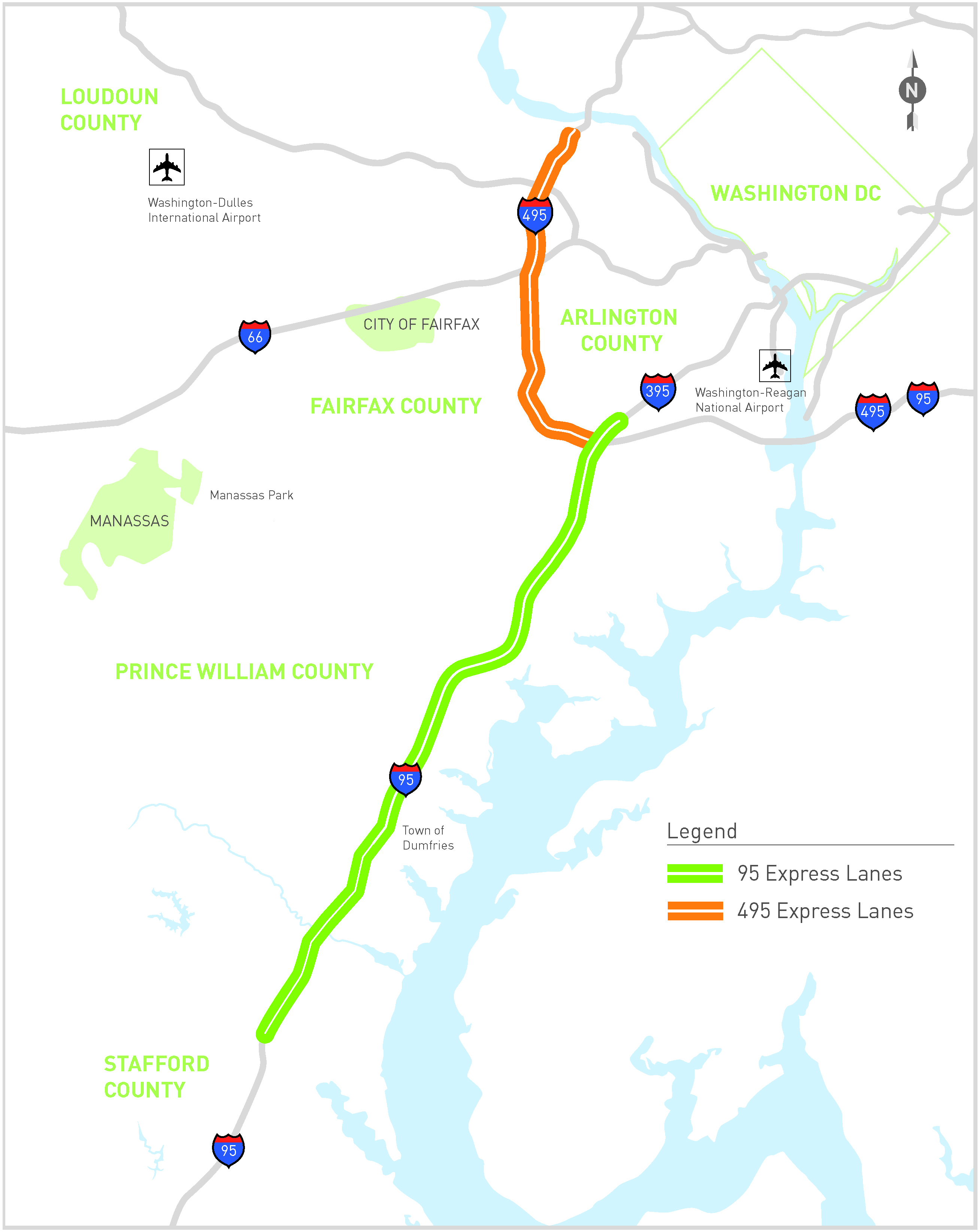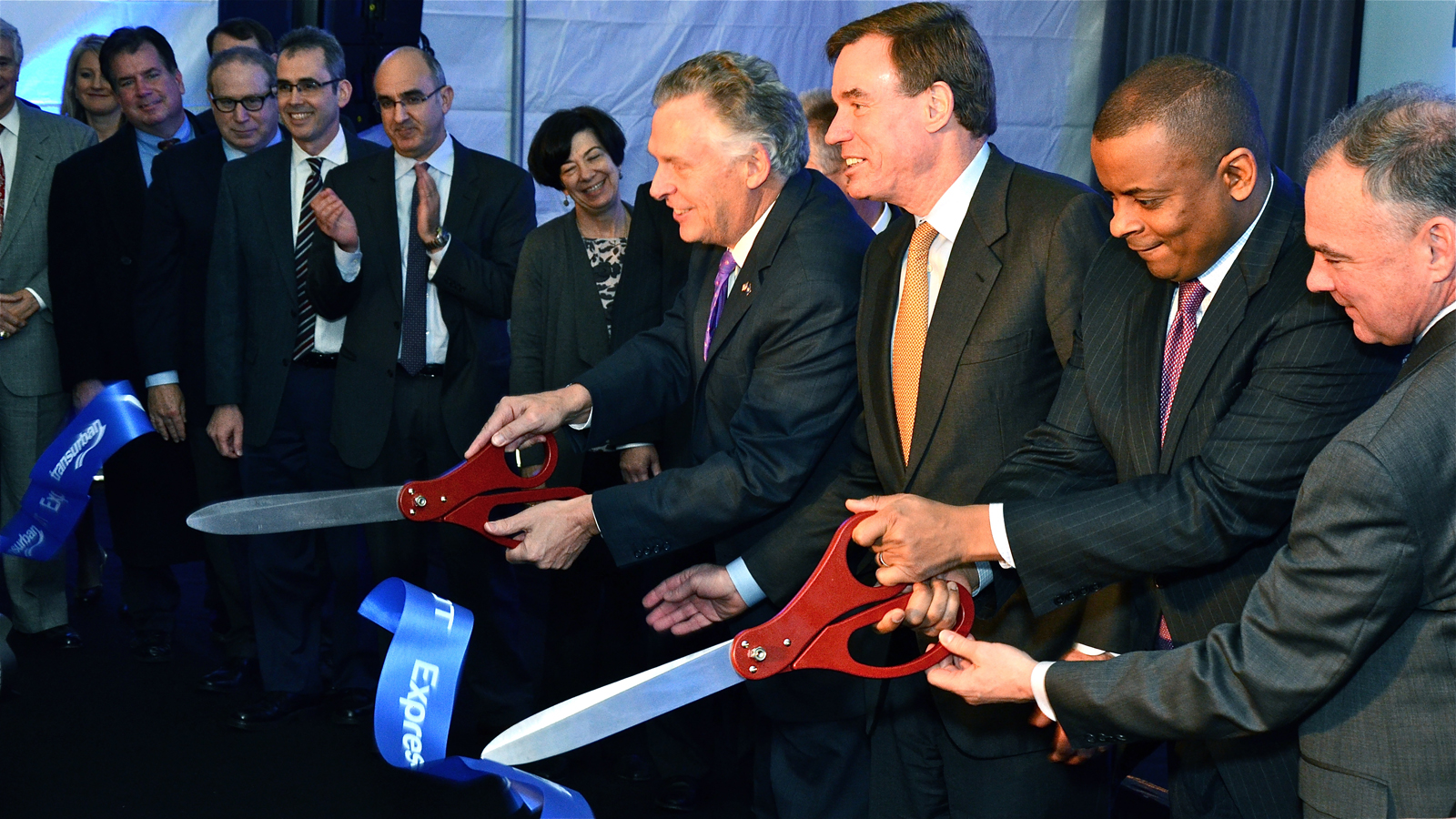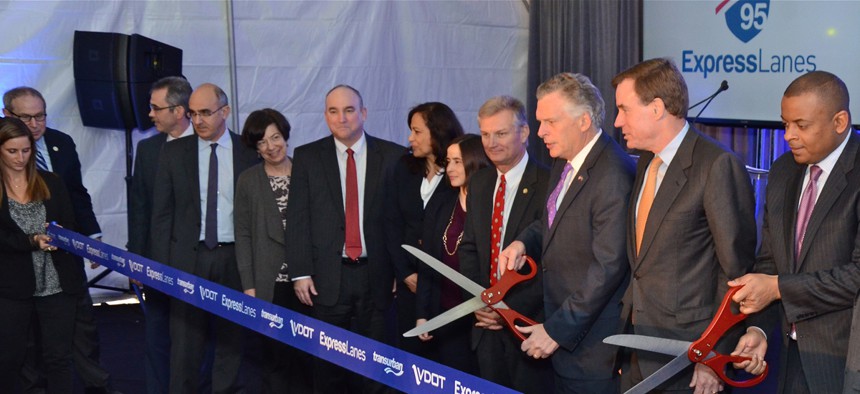Connecting state and local government leaders
Toll projects so far have proven to be the riskiest types of public-private partnerships.
SPRINGFIELD, Va. — For thousands of commuters in the National Capital Region, the biggest gift of the holiday season might be the opening of new tolled express lanes along Northern Virginia’s crowded Interstate highways.
The newly opened lanes on Interstate 95 and a portion of Interstate 395—converted from high-occupancy vehicle lanes—have given drivers the option of paying variable-rate tolls to avoid congestion along some 29 miles of highway stretching from deep in the southern exurbs of Washington, D.C., to a point just inside Interstate 495, better known as the Capital Beltway.
The project provides direct connections to 14 miles of tolled express lanes that opened two years ago along the Beltway on the Virginia side of the Potomac River between the massive Springfield interchange and the Tysons Corner area.

Courtesy Transurban
The D.C. region has ranked first or second among the nation’s most-congested metropolitan areas for years. Listeners to local traffic reports have learned to pity commuters interminably stuck in places like Woodbridge, Dumfries and other places “near the Occoquan” River along I-95 in Northern Virginia.
The Beltway in Maryland is no better, the radio traffic jocks report.
Users of the new lanes will pay tolls their operator says could rise to 80 cents a mile during peak rush hour, so a drive along the length of the system could cost upwards of $30.

But it could be more. There is no ceiling on the tolls, and the system’s “variable pricing” policy is meant to control traffic so as to assure drivers in the new lanes that they will usually be able to travel at 65 miles per hour. The system makes minute-by-minute fee adjustments in reaction to the volume of traffic using the tolled express lanes.
Toll Road Hazards
Pricing, and volume, is important to the viability of the public-private partnerships, commonly referred to as P3s, that financed the projects. And for the state governments that negotiated the projects, the accuracy of volume and revenue projections determine whether or not the deals were good for taxpayers.
The hazards of forecasting were underlined in September, when the private operators of the Indiana Toll Road filed for bankruptcy. ITR Concession Co. LLC, owned by Spanish infrastructure company Ferrovial SA and Australian investment bank Macquarie Group Ltd, had bought the toll road from the state in 2006 for $3.85 billion, then spent $458 million to improve the 156-mile highway.
The commerce-heavy highway, connecting Chicago with points east across the far northern tier of the Hoosier State, failed to meet expectations during and after the 2008 recession, and ITR’s $6 billion in debt is now being restructured in Chapter 11 proceedings.
A question here is whether the state is left holding the bag. But Gov. Mike Pence has assured drivers they won’t be affected for now. And in hindsight, the deal looks like a good one for Indiana. The investors paid twice what the state expected, documents unearthed by The Bond Buyer show, and the cash infusion enabled Indiana to complete other badly needed infrastructure projects.
So governments have used these P3s to offer drivers relatively rapid development of new or improved infrastructure without committing the levels of funding that would be required in an purely public project. Much of the risk is taken by the private developers, although state funds and federally-subsidized loans are also part of the mix.
In exchange, governments are using eminent domain and agreeing to conditions that benefit private entities, and, as noted, tolls can rise. Fees for using the Indiana Toll Road could well skyrocket under new ownership.
On Interstate 635 in the Dallas area, as in Virginia, a private operator, Spain-based Cintra, uses congestion tolling and charges Texas commuters 95 cents a mile to access its tolled express lanes during peak hours. Once the full project is open, it will cost more than $24 a day to get to and from work using the lanes, according to Terri Hall, a San Antonio-based expert on freeway-to-tollway conversion projects.
Another Texas P3 project, on a portion of State Highway 130 south of Austin, has had problems, as Cintra, in partnership with Zachry American Infrastructure, had to restructure its financing less than two years after opening the 41-mile stretch of road when it was unable to fully meet a debt service payment in June 2014.
Extensive conversion of free highways to P3 toll roads has caused a backlash in Texas as drivers protest against paying for what had been free, The Wall Street Journal has reported.
Other toll roads backed by private financing have struggled in recent years, as well, The Wall Street Journal noted in a September article:
American Roads LLC, which operates toll roads in Alabama and Michigan, restructured its debt through Chapter 11 last year. In June, the Portuguese operator of the Northwest Parkway in Denver tapped restructuring advisers in the face of a high debt load. In 2011, San Diego's South Bay Expressway, built by a company owned by a Macquarie-managed investment fund, exited bankruptcy protection under a plan that wiped hundreds of millions of dollars of debt from its balance sheet.
Last spring, Transurban handed over handed over operation of the Pocahontas Parkway (State Highway 895) near Richmond, Virginia, to its creditors, a consortium of European banks that had DBi Services take over operations of the lackluster toll road. Last year, The Wall Street Journal published an extensive, front-page analysis of the problems P3 toll roads were facing.
Easing Virginia’s Traffic Congestion
In Virginia, the Transurban/Fluor partnership has already had to restructure its debt on its previous Capital Beltway projects, which cost $1.9 billion to build—including $400 million in state funding.
Transurban CEO Scott Charlton recently told WAMU-FM that profitability is five or more years away. Traffic projections, made before the Great Recession, haven’t been met since the toll lanes opened in November 2012, and the novelty of the lanes and their variable pricing have also contributed to lower-than-anticipated volume so far.
Even though there are no toll barriers, there is a barrier to entry of a different sort: Users must use an E-ZPass device in order to pay the toll electronically. Buses and carpoolers with three or more passengers need a special two-function E-ZPass Flex device if they want to claim the free rides available to them on the express toll lanes. Carpoolers can cut into revenues, and so there’s provision for the state to reimburse the private operators if their volume exceeds expectations.
Transurban built four new I-495 express lanes—two in each direction—in the center of the existing Capital Beltway.
One committed user, Northrop Grumman executive Gary Fourney, reports that traffic is often crawling on the Beltway’s main toll-free lanes as he whizzes by at 65 miles per hour, driving 7.4 miles along the tolled lanes. In November, his tolls ranged from $2.10 to $8.75 and he is spending about $140 a month to save what he calculates as 30 to 45 minutes each way, or up to 90 minutes a day in the car.
The pricing policy has some worried that the “haves” will benefit while high costs will consign “have-nots” to the slow lanes.
Indeed, when a sinkhole recently crippled traffic along the George Washington Memorial Parkway—a key feeder road connecting the Beltway to downtown Washington, D.C.—on the Virginia side of the Potomac River, tolls on the 14 miles of the I-495 express lanes climbed as high as $14.40. Accidents on or near the American Legion Bridge, which carries the Beltway across the river to Maryland, have also sent tolls rising to that level.
Transurban is counting on continuing growth in usage of the lanes and, indeed, trips and revenues have been growing over the past year. The company is taking a tough line on toll collection. In October it issued a stern statement warning people that they faced fines if they used the roads without the E-ZPass transponder.
In early December, a spokeswoman told local television reporters that people who tried to game the carpooling regulations would be fined $125 for the first offense and $250 for the second.

Courtesy Transurban
Much fanfare has attended the opening of the $900-million toll road project in the I-95/I-395 corridor. Virginia Gov. Terry McAuliffe was joined by two of the three most recent former governors who advanced the project in a Dec. 9 ceremony announcing that the refurbished high-occupancy vehicle lanes would open for business on Dec. 14.
Drivers will have free use of the lanes until Dec. 29, when tolling will begin officially. Transurban has been extensively advertising the new service with a cover-wrap and full-page ads in The Washington Post and other media buys. The company expects that the express toll lanes will benefit not only single drivers and carpoolers but also people choosing to ride new commuter bus services that have begun to use the rapid-travel lanes.
The Future of P3s
Moody’s Investors Service in 2013 downgraded Texas State Highway 130’s bonds to junk status, and in July 2014, it declared that the roadway’s operators were in default on their debt.
But other toll road projects have better ratings, reflecting improving prospects of a good return on investment over the longer term. In Virginia, Indiana and elsewhere the toll roads are leased to operators for 75 or more years.
On Nov. 18, Moody’s upgraded its outlook for the U.S. toll road industry from “negative” to “stable,” predicting that 2015 would see continued traffic growth and rising toll revenues. The bond rating service noted risks to its forecast, including dependence by state and local governments on “excess” toll revenue to finance other spending, and the uncertainty of traffic growth forecasts.
Toll roads so far have proved the riskiest kinds of P3s. To date, they comprise a tiny fraction of the country’s major road network. Infrastructure experts say the absence of consistent, stable institutional models for the projects remain an obstacle. But these experts also say investors are sitting on a lot of capital that could be invested to address not only our highways—which have lost their public-financing consensus—but also P3 projects ranging from ports to airports to highway travel plazas to Army base housing.
If bankers, investors and governments can figure out how to reliably apportion risk in P3 deals, the United States could benefit from a large infusion of private capital for vitally needed projects that now seem out of reach for our deficit-ridden public sector. That would be good news indeed for harried drivers, transit riders and other users of key infrastructure from sea to shining sea.
Timothy B. Clark is an editor-at-large at Government Executive.




